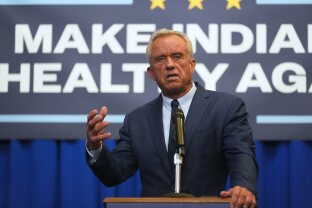Health Secretary Robert F. Kennedy Jr.'s hand-picked vaccine panel is leaving its vote on whether to stop recommending the Hepatitis B vaccine for newborns for another day.
The Advisory Committee on Immunization Practices on Friday opted to indefinitely table its scheduled vote on whether newborns should continue to receive the Hepatitis B vaccine immediately after birth, with its members saying they felt unready to make the decision.
“We are more prudent when we are cautious,” said ACIP member Joseph Hibbeln, a neuroscientist who formerly worked at the National Institutes of Health.
The delay may irk Kennedy and other members of the “Make American Healthy Again” movement, who have argued that the Hepatitis B vaccine is not necessary for infants because they are unlikely to be exposed to the virus. Public health experts say the vaccine is safe and not providing it at birth will result in more infants contracting Hepatitis B, which can cause liver cancer.
“Many adults with Hepatitis B do not look or feel sick, and may not be aware they could transmit the virus to an infant they are caring for. Vaccinating newborns provides a critical safety net for children,” James Campbell, a member of the American Academy of Pediatrics, said in a statement.
The committee, part of the Centers for Disease Control and Prevention, voted on Thursday to no longer recommend children receive the combined version of four important immunizations for measles, mumps, rubella and varicella. Instead, the committee will recommend splitting up the MMRV vaccine into two different doses: one for measles, mumps and rubella and one for varicella.
But in a sign of how green the committee is, it had to re-vote Friday on whether the Vaccines for Children Program, a low-income program which provides immunizations to about half of the country’s youth, could cover the combined MMRV vaccine. The committee changed its decision Friday from allowing the VFC program to cover the combined shot to no longer allowing it.
Some members said they misunderstood the vote when it was first taken on Thursday. Five people on the committee were appointed in the past week.
In a Thursday morning press conference hosted by the progressive PAC 314 Action, Gov. Josh Green of Hawaii said he was concerned that the ACIP vote was just the “tip of the iceberg.”
“I have every expectation that after they act on Hepatitis B and covid vaccinations, they will move to other vaccinations like the HPV vaccination,” said Green, who is a physician.
Kennedy has previously cast doubt on the effectiveness of the HPV vaccine and was involved in litigation against its manufacturer, Merck.
Sign in
Log into your free account with your email. Don’t have one?
Check your email for a one-time code.
We sent a 4-digit code to . Enter the pin to confirm your account.
New code will be available in 1:00
Let’s try this again.
We encountered an error with the passcode sent to . Please reenter your email.


